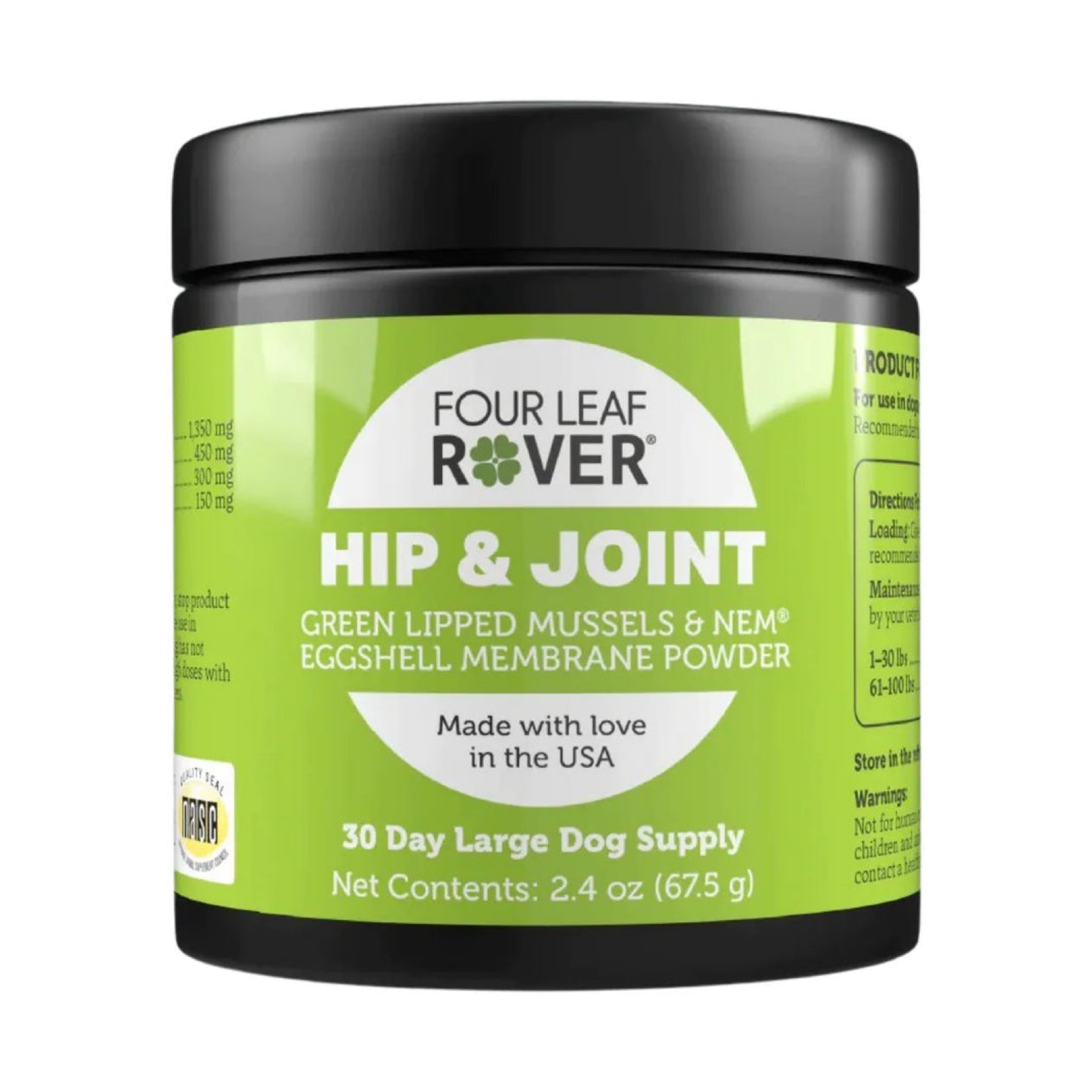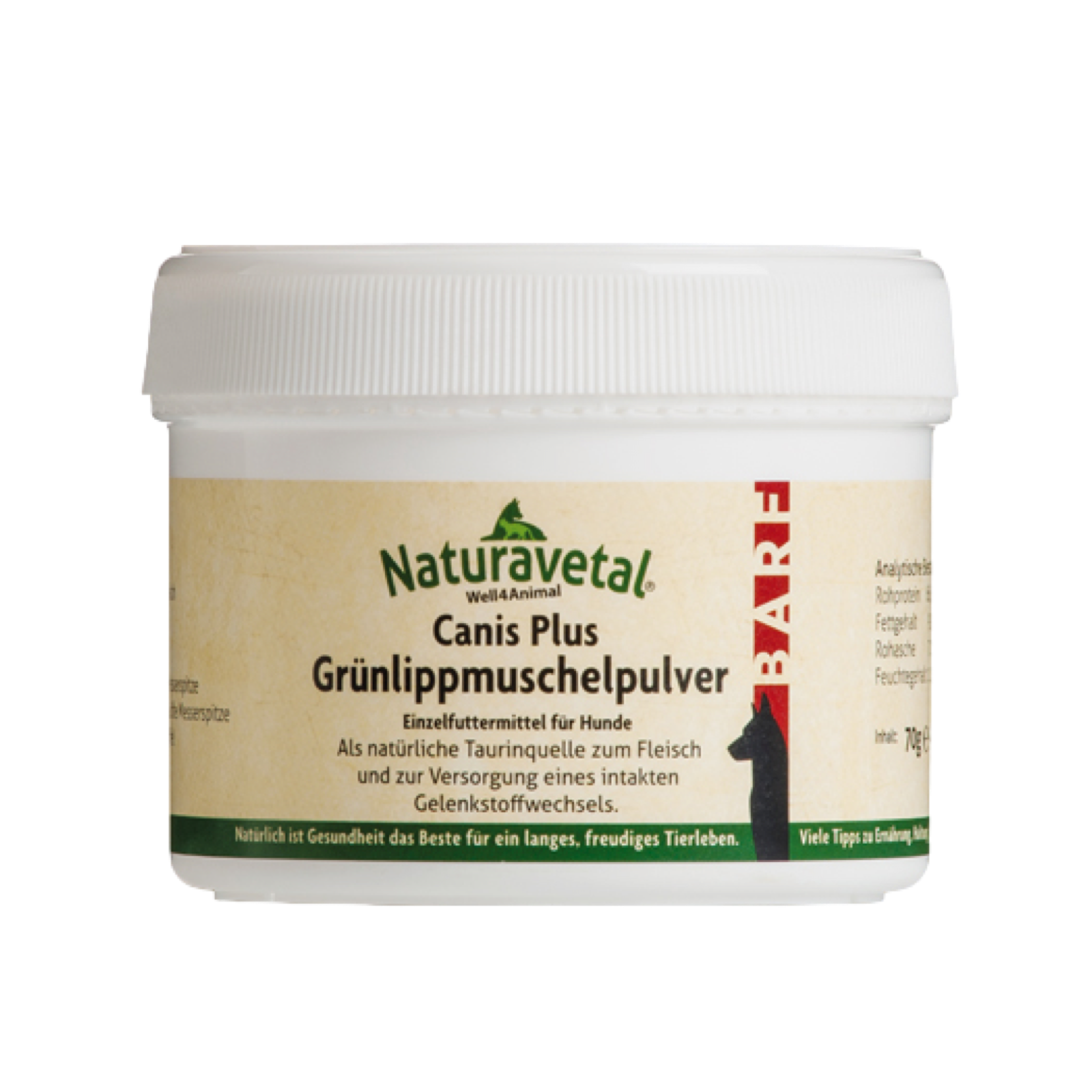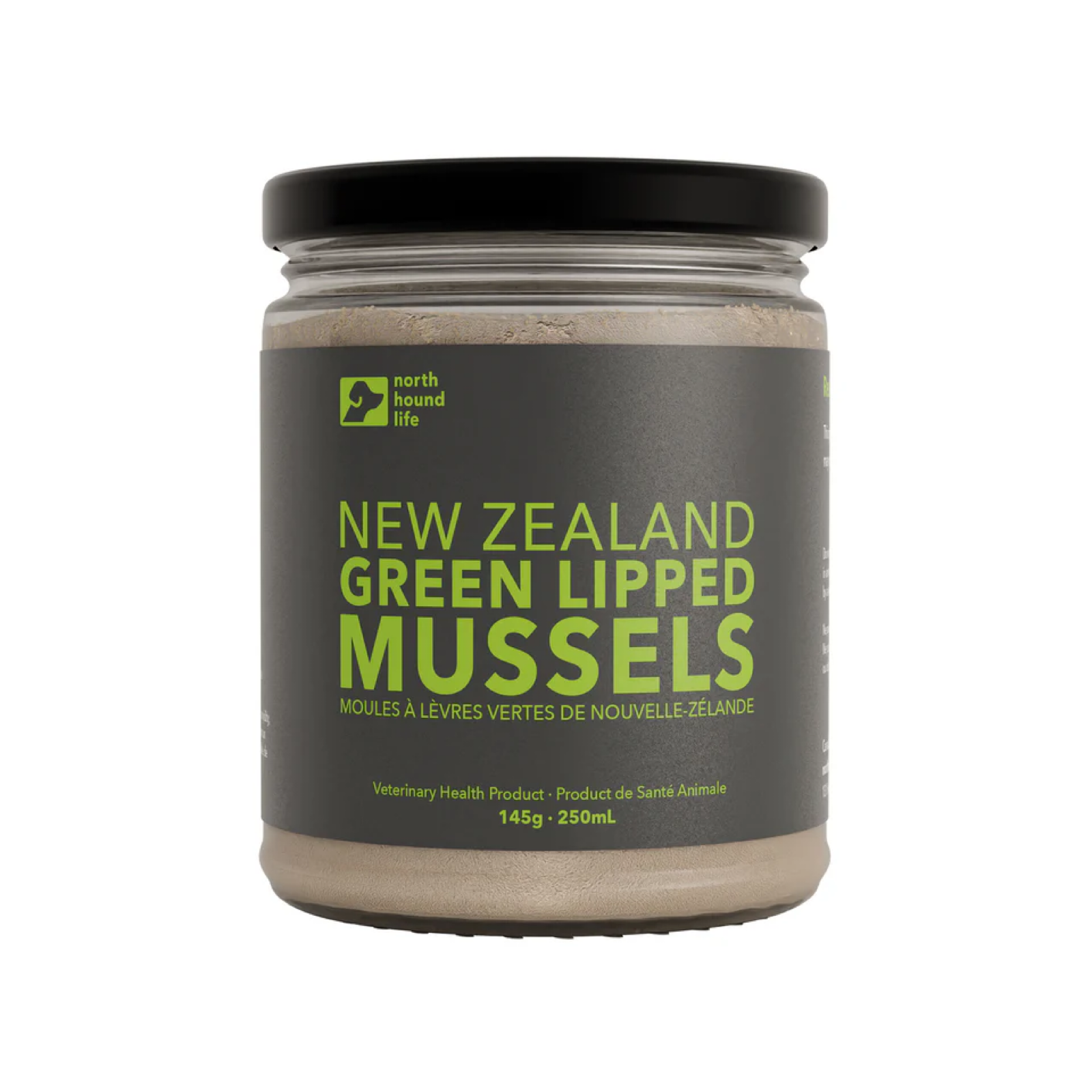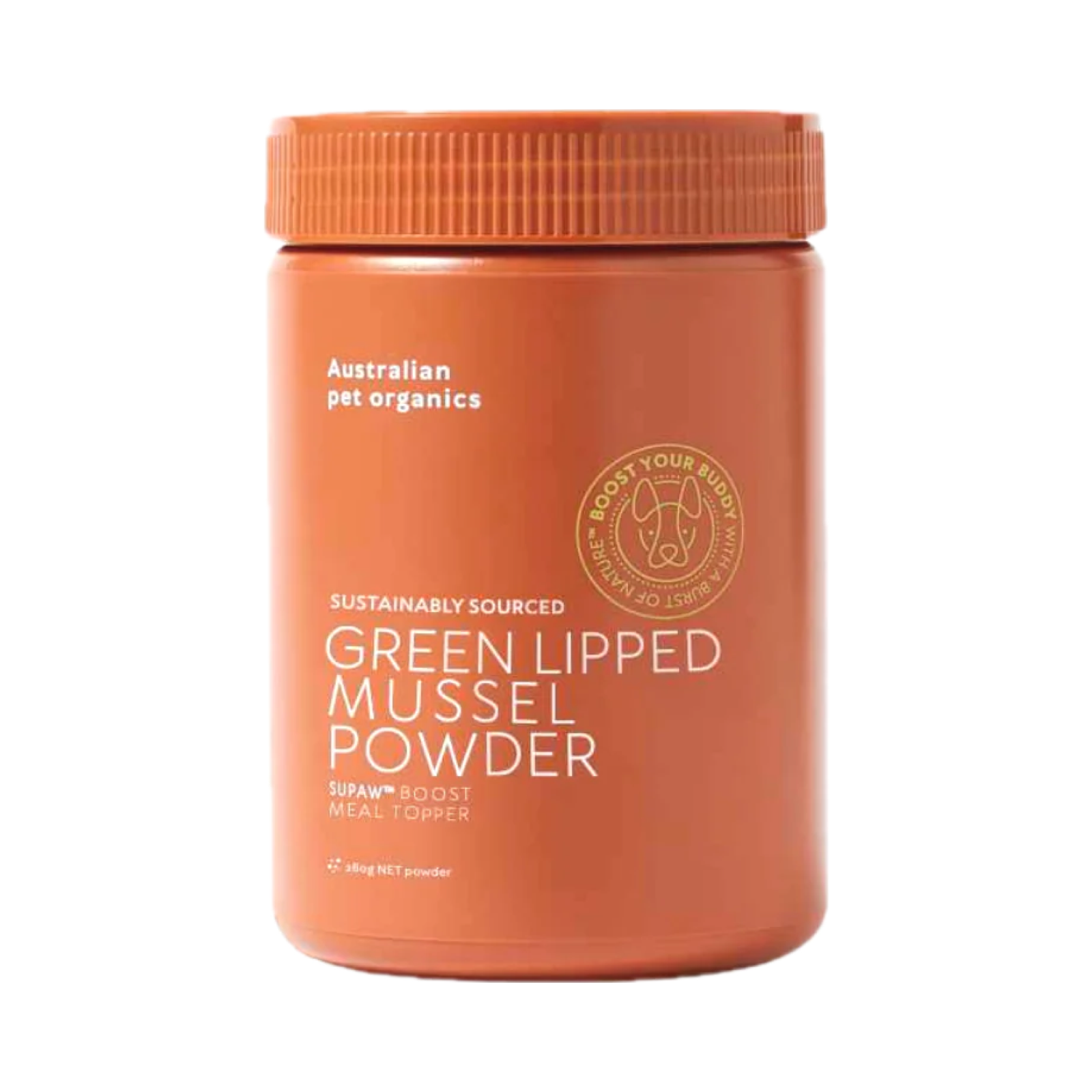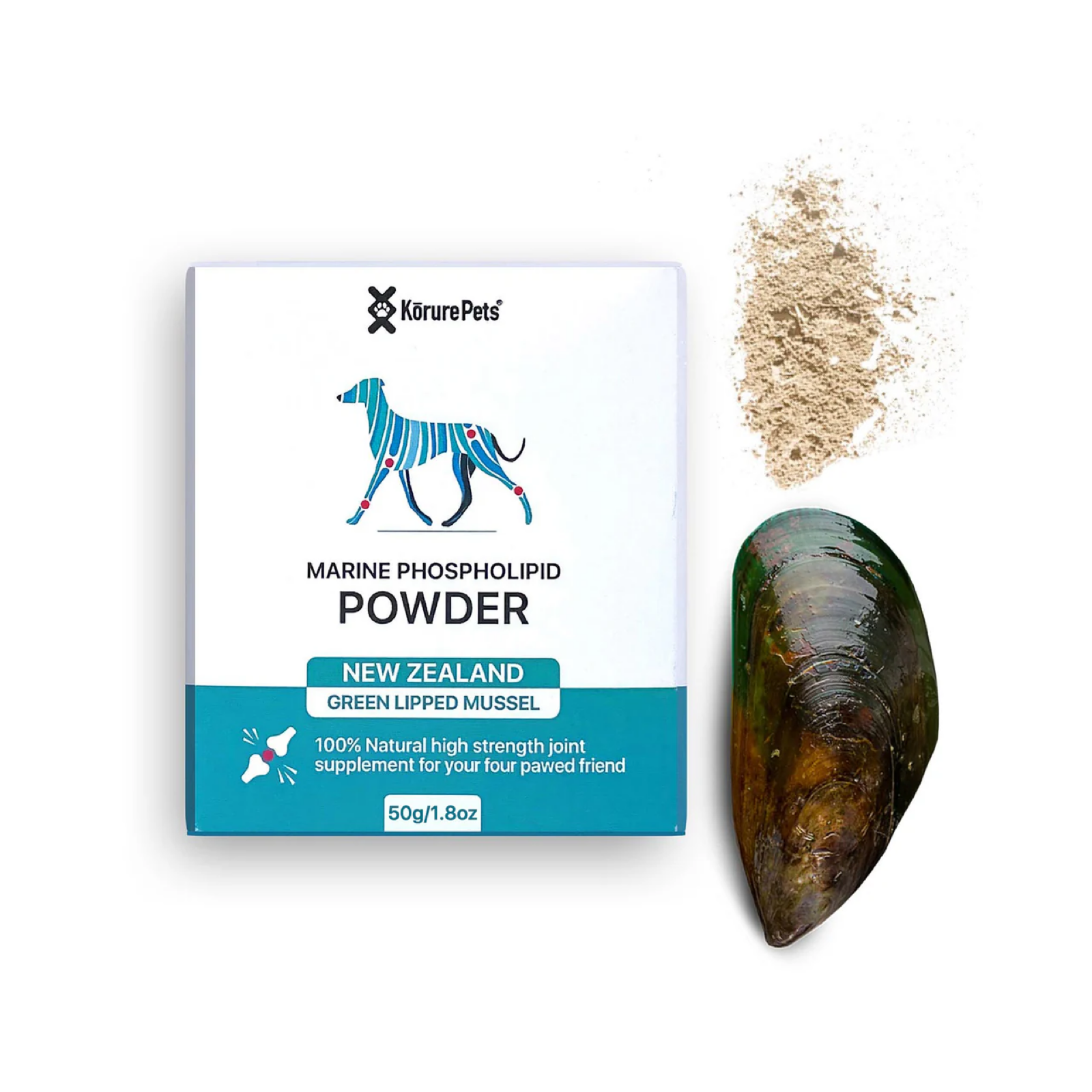Green Lipped Mussels
Quick Summary: Green-Lipped Mussels – A Natural Joint & Omega-3 Powerhouse for Dogs
Green-lipped mussels from New Zealand are a natural, nutrient-rich source of omega-3 fatty acids, especially ETA (Eicosatetraenoic Acid)—a rare anti-inflammatory compound not found in fish oils. In addition to EPA and DHA, these mollusks offer joint-supporting compounds like glucosamine, chondroitin, and hyaluronic acid, making them an ideal choice for dogs with mobility issues or arthritis. Sustainably farmed and minimally processed, green-lipped mussels are a holistic addition to a natural health plan for dogs.
What are Green Lipped Mussels (GLM)?
In the realm of canine nutrition, the search for natural or holistic remedies and whole foods for our dogs to promote health and vitality is an ongoing quest. One whole food gem that has garnered attention in recent years is the humble green-lipped mussel. These oceanic wonders are not only a culinary delight for humans but also pack a powerful punch in terms of health benefits for our beloved canine companions. In this article, we delve into the myriad advantages of incorporating green-lipped mussels into your dog's diet, unlocking the secrets of this superfood for paws.
Green-lipped mussels, scientifically known as Perna canaliculus, are native to the pristine waters of New Zealand. What sets them apart from other shellfish is their unique composition, brimming with essential nutrients vital for canine health.
Main Benefits
Green-lipped mussels are a fantastic addition to a dog's diet for several reasons:
1. Joint Health: Perhaps the most celebrated benefit of green-lipped mussels lies in their ability to bolster joint health. Rich in glucosamine, chondroitin sulfate, and other glycosaminoglycans (GAGs), these mollusks provide natural building blocks for cartilage repair and maintenance. For dogs suffering from arthritis, hip dysplasia, or general joint stiffness, the anti-inflammatory properties of green-lipped mussels can offer much-needed relief, restoring mobility and comfort.
Green-lipped mussels act as COX inhibitors, providing anti-inflammatory benefits like NSAIDs. However, they differ in two key aspects:
1. While NSAIDs may harm the liver and gut lining by inhibiting COX enzymes, green-lipped mussels contain LOX inhibitors, protecting these vital organs.
2. Unlike NSAIDs, green-lipped mussels not only reduce inflammation but also contribute to joint health, offering a more comprehensive approach to canine wellness.
2. Immune Support: A robust immune system is the cornerstone of good health, and green-lipped mussels offer a natural way to fortify your dog's defenses. Laden with vitamins, minerals, and antioxidants, including vitamin C, vitamin E, zinc, and selenium, these shellfish can help ward off infections, reduce oxidative stress, and support overall vitality. Incorporating green-lipped mussels into your dog's diet can be particularly beneficial during times of stress, illness, or recovery.
3. Omega3 Fatty Acids: The omega-3 fatty acids EPA (eicosapentaenoic acid) and DHA (docosahexaenoic acid) are essential for overall health, and green-lipped mussels are a potent source of these beneficial fats. By incorporating omega-3s into your dog's diet, you can support cardiovascular health, reduce inflammation, and promote shiny coats and healthy skin. Additionally, these fatty acids play a crucial role in cognitive function, making green-lipped mussels an excellent choice for senior dogs or those undergoing training.
4. Digestive Health: The gastrointestinal tract plays a crucial role in nutrient absorption and immune function, and green-lipped mussels can contribute to digestive wellness in several ways. Rich in proteins, enzymes, and bioactive compounds, these mollusks promote a healthy gut microbiome, aid in digestion, and alleviate gastrointestinal inflammation. For dogs with sensitive stomachs or digestive issues, adding green-lipped mussels to their diet may offer relief and improve overall digestive function.
Why Green-Lipped Mussel is a Superior Source of Omega-3s for Dogs
GLM contains a rich spectrum of omega-3s—especially EPA, DHA, and uniquely ETA, which plays a distinct role in the inflammatory pathway. While EPA and DHA are well-known for supporting cardiovascular, cognitive, and skin health, ETA has shown the ability to downregulate COX-2 enzymes at the gene level, meaning it may modulate inflammation more deeply and effectively at lower doses than standard marine oils .
These omega-3 fatty acids in GLM are also bound to phospholipids rather than triglycerides (as found in most fish oils), which significantly improves their bioavailability—making them easier for a dog’s body to absorb and utilize.
Study Insight: A comparative study in Progress in Lipid Research noted that phospholipid-bound omega-3s are more efficiently incorporated into cell membranes, potentially offering superior anti-inflammatory and cellular support .
The Role of Fat Content and Cold Extraction
The fat content of green-lipped mussels typically ranges from 4–14%, depending on environmental conditions and harvesting time . This fat fraction is what contains the omega-3 fatty acids, phospholipids, and other lipid-based nutrients. A higher fat content typically means a richer source of active compounds—but preserving their integrity is crucial.
Cold extraction is essential when processing GLM for supplements. Heat, oxygen, and light can oxidise omega-3s and degrade their potency. A cold extraction process protects delicate fats and ensures that the resulting supplement retains its full spectrum of bioactive lipids, including ETA.
Look for terms like:
Cold-extracted
Freeze-dried whole mussel powder
Stabilised lipids
Clinical Insight: Studies show that heat-damaged lipids in poorly processed marine supplements reduce efficacy and can even promote oxidative stress rather than reduce it .
Additional Bioactive Compounds in GLM
Beyond omega-3s, green-lipped mussels are a rich source of joint-supportive nutrients that work synergistically to support canine mobility and comfort:
Glycosaminoglycans (GAGs): Help maintain joint cartilage and lubrication
Chondroitin sulfate: Natural anti-inflammatory and cartilage protectant
Phospholipids: Enhance omega-3 absorption and cellular delivery
Antioxidants and trace minerals: Including selenium, zinc, manganese, and copper
Vitamins C, E, and B12: Support immune, metabolic, and connective tissue health
Is Green-Lipped Mussel Sustainable?
Yes—when sourced responsibly, GLM is widely considered one of the most sustainable marine omega-3 sources. These mussels are cultivated in eco-certified aquaculture farms in New Zealand that are tightly regulated to ensure minimal environmental disruption.
Because mussels are filter feeders, they don’t require feed inputs, antibiotics, or additives. In fact, their presence helps clean the ocean, making their farming process regenerative rather than extractive.
The New Zealand Ministry for Primary Industries (MPI) classifies green-lipped mussel farming as low-impact and sustainable under its aquaculture guidelines .
How to Choose a Reputable GLM Supplement for Dogs
When selecting a natural green-lipped mussel supplement for your dog, it's essential to consider several key factors to ensure its quality and effectiveness:
1. Source and Purity: Look for supplements sourced from reputable regions known for their clean and unpolluted waters, such as New Zealand. Ensure that the product undergoes rigorous testing for purity, free from contaminants such as heavy metals, toxins, and pollutants.
2. Ingredients: Opt for supplements made from pure, high-quality green-lipped mussels without unnecessary additives, fillers, or preservatives. The fewer the ingredients, the better, as it reduces the risk of potential allergens or adverse reactions.
3. Bioavailability: Choose supplements that are formulated for optimal absorption and bioavailability, ensuring that your dog can reap the maximum benefits from the nutrients present in green-lipped mussels. Consider factors such as the supplement's form (powder, capsule, liquid) and any additional ingredients that may enhance absorption, such as natural oils or fats.
4. Nutritional Analysis: Prioritise supplements that undergo comprehensive nutritional analysis, providing transparency regarding their nutrient content, including protein, omega-3 fatty acids, and other essential nutrients. Look for products with a guaranteed minimum level of key nutrients, such as glucosamine, chondroitin sulfate, EPA, and DHA.
It's also important to ensure that you request a nutritional analysis of the green-lipped mussel product for your dog. Aim for a minimum fat content of 6%, as anything lower may not provide optimal benefits for your furry companion. Additionally, be cautious of green-lipped mussel products in a water base, as they may lack essential fatty acids, diminishing their effectiveness.
5. Dosage and Administration: Pay attention to the recommended dosage instructions provided by the manufacturer, taking into account your dog's size, weight, and specific health needs. Ensure that the supplement offers convenient administration options suitable for your dog's preferences, whether it's a powder that can be mixed with food or a capsule that can be given whole or opened and sprinkled onto food.
6. Quality Assurance: Choose supplements from reputable brands that adhere to strict quality control standards and certifications, such as Good Manufacturing Practices (GMP) or third-party testing. Look for products that are veterinarian recommended or endorsed by trusted animal health professionals.
By considering these factors, you can confidently select a natural green-lipped mussel supplement that meets your dog's specific needs and provides optimal support for their joint health, mobility, and overall vitality.
GLM Products We Recommend
At The Balanced Canine, we recommend the following high-quality GLM supplements based on sourcing, processing method, and transparency:
Four Leaf Rover – Safe-Sea: A combination of green-lipped mussel and cold-extracted calamari oil
Riaflex Green-Lipped Mussel Powder: Pure, freeze-dried, whole-mussel powder from New Zealand
North Hound Life GLM: Small-batch, freeze-dried GLM from a trusted Canadian supplier
Aniforte Green Lipped Mussel Powder from a licensed marine farm in New Zealand. There, the mussels are processed as a whole by gentle freeze-drying, the product retains a higher fat content of 8%
Mollies Organics Green Lipped Mussel Powder Pure, freeze-dried, whole-mussel powder from New Zealand
These options are suitable for dogs needing omega 3 fatty acids, joint support, inflammation control, or as part of a long-term mobility strategy.
Should You Choose Green-Lipped Mussel Over Fish Oil?
When comparing green-lipped mussel (GLM) to traditional fish oil as a source of omega-3 for dogs, GLM stands out as a more complete and multifunctional option—especially for dogs dealing with arthritis, mobility issues, or chronic inflammation. While fish oil is a well-known source of EPA (eicosapentaenoic acid) and DHA (docosahexaenoic acid), GLM contains these essential fatty acids alongside a rare and highly beneficial omega-3 known as ETA (eicosatetraenoic acid). Unlike EPA and DHA, ETA works earlier in the inflammatory pathway and may inhibit inflammation at the gene expression level, offering potentially greater anti-inflammatory effects even at lower dosages.
What truly sets GLM apart is its nutrient-rich composition. In addition to omega-3s, it provides glycosaminoglycans (GAGs), naturally occurring chondroitin sulfate, phospholipids for enhanced bioavailability, and a range of antioxidants and trace minerals. This unique combination not only helps reduce inflammation but also supports the maintenance and repair of joint tissue, making GLM particularly effective for supporting dogs with arthritis, hip dysplasia, intervertebral disc disease (IVDD), or breed-related joint concerns—such as those commonly seen in Cavalier King Charles Spaniels, Labradors, and Golden Retrievers.
One of the most compelling advantages of GLM is its clinical efficacy. Some studies have found that dogs supplemented with GLM experienced more significant improvements in arthritis scores compared to those receiving standard doses of fish oil—despite receiving GLM at lower dosages. These results suggest that GLM’s bioactive compounds are not only more potent but also better absorbed, resulting in more effective joint and inflammation support. A study published in the Journal of Nutrition highlighted statistically significant reductions in arthritis-related lameness and pain in dogs receiving green-lipped mussel compared to controls supplemented with conventional fish oil.
Pet parents are increasingly turning to GLM because of its lower effective dose requirements, its whole-food, non-synthetic formulation, and its sustainable sourcing from the clean waters of New Zealand. When cold-extracted or freeze-dried, GLM retains the integrity of its delicate fatty acids and joint-supportive compounds—delivering a high-impact, low-intervention option for long-term joint health.
While more direct comparative studies between GLM and fish oil are still needed, existing evidence strongly supports the use of GLM as a superior alternative—particularly for managing arthritis and improving mobility in dogs. With its combination of omega-3s, joint-repairing nutrients, and enhanced bioavailability, green-lipped mussel offers a broader and more comprehensive approach to canine inflammation and mobility support than fish oil alone.
By selecting a high-quality, cold-extracted GLM supplement, you’re giving your dog not just a source of omega-3s—but a whole-body support tool backed by nature and science.
Conclusion
In conclusion, green-lipped mussels stand as a nutritional powerhouse for dogs, offering a multitude of health benefits that can enhance their quality of life. Whether you have a young pup in need of joint support, a senior dog grappling with arthritis, or simply want to optimize your canine companion's overall wellbeing, incorporating green-lipped mussels into their diet is a wise choice. Remember to source high-quality, responsibly harvested mussels and introduce them gradually into your dog's meals to reap the full spectrum of benefits that this superfood for paws has to offer.


